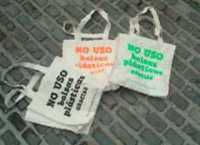Many more people, I am sure, would love (to be) able to buy most if not indeed all of what they buy, as far as this is possible, under the Fairtrade label but the prices of the products too often are rather prohibitive. This is especially so for those on a so-called “fixed income”, e.g. those in the lower income brackets, including us poor writers. You think I am joking as regards to writers, but I am not.
It appears to me, though, that if Sainsbury's can sell Fairtrade certified and labelled bananas under its white Basics label at around 99pence a bag them other retailers add a premium here somewhere.
The same is true for tea and coffee. Sainsbury's recently went over to Fairtrade certification with its Red Label tea, loose and teabags, at no extra costs (so far). If it can be done by Sainsbury's then I am sure other larger retailers can do the same without having to reduce the amount that the producers get.
Now, the point that I am trying to make here is this: Why do Fairtrade certified and labelled products and goods cost so much more from other manufacturers and retailers? Is someone out there really trying to make us believe that they who have a larger price tag on their products share a greater proportion of their profits from the sales of their Fairtrade labelled goods and produce with the producers and makers? They must really think that the consumers have fallen off the turnip wagon somewhere along the line. Or are there some people out there who are really that gullible?
I think we, the consumers and we from the media, must remind those companies that we are not silly and that we do know about the bottom line and about shareholders.
While I can understand smaller companies who sell Fairtrade goods being more expensive than the large outlets, whether Sainsbury's, Tesco, Asda, or whoever and whatever, as the smaller the company the harder the overheads and everything bites, and also the transport costs and all that, I cannot understand why we are being fleeced by the big boys, especially by those of which I am certain that they do not contribute more to the producers than the absolute required minimum under the appropriate schemes.
This is the same not just with the Fairtrade label, is it now? The same is true with the “organic” label, whether on food or on other items. While there may be some additional costs in organic food production or cotton production, due to the fact that neither artificial fertilizers nor pesticides are being used or are allowed to be used and therefore there may be some losses and such, the premium in general, I am sure, does not equate those factors. In other words; it is the consumer, who wants organic or Fairtrade, or environmentally friendly, who is being fleeced by the companies, yet again.
© Michael Smith (Veshengro), February 2008
Blog Archive
-
▼
2008
(56)
-
▼
February
(12)
- Papapaa DVD and photo pack for schools – Review
- Dubble Chocolate Bar – Product Review
- Fair Trade and the Bottom Line
- BOGO LIGHT - Advertisement
- Nicaragua Solidarity Campaign - Advert
- Big Nationals and Multinationals joining the Fairt...
- Fairtrade Fortnight Launched
- Tate & Lyle goes “Fairtrade”
- The BoGo Light – Product Review
- ROLL UP FOR FAIRTRADE FUN THIS FAIRTRADE FORTNIGHT
- Fairtrade Fortnight - Advertisement
- BOGO LIGHT - Advertisement
-
▼
February
(12)


No comments:
Post a Comment